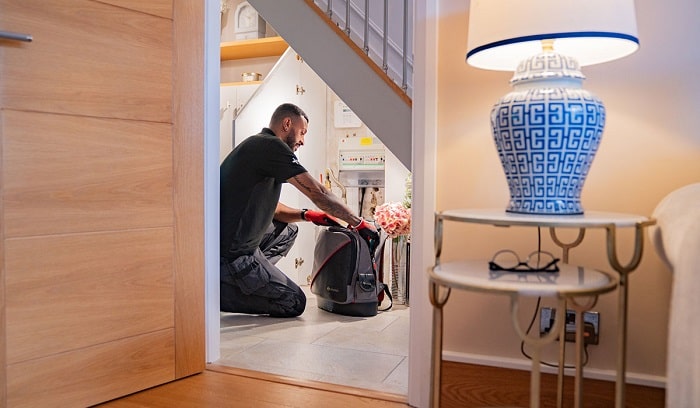
Generally, the gas safety of tenants is the responsibility of landlords. In the case of a "Council Tenant", the landlord is the council itself. Therefore, the council, acting as a landlord, assumes responsibility for the safety of its tenants against the typical risks associated with gas, including fire, explosion, and carbon monoxide poisoning.
Accordingly, the councils are legally bound, under the Gas Safety (Installation and Use) Regulations 1998, to ensure that the gas appliances provided in their rented properties are maintained properly and remain gas safe at all times. When a local council rents out any of its properties, it automatically assumes the role of a landlord, which places strict responsibilities on it to ensure safe living conditions for its tenants.
On the other hand, council tenants are equally responsible for ensuring that their homes are gas-safe. At the same time, if a council tenant installs any gas appliance in a rented house for their personal use, the maintenance and gas safety of that particular appliance is the sole responsibility of the council tenant. In this scenario, the council's duties would be limited to maintaining and ensuring the gas safety of flues and chimneys, while maintaining an uninterrupted gas supply.
Keep reading this blog to get awareness about your rights and responsibilities in the capacity of a Council Tenant.
In the UK, local authorities, commonly referred to as "the Council", offer housing facilities on affordable rental terms. It is intended for low-income individuals or those who require secure accommodation. Anyone who rents a home directly from these councils is referred to as a "council tenant", whereas the Council becomes a landlord, often termed "Council Landlords".
Individuals or families renting accommodation from local councils must enter into a tenancy agreement, as per the prevailing rental laws. In this case, the councils are legally required to fulfill the duties of landlords, which include maintaining the rented-out properties, ensuring that all gas appliances, fittings, flues, and chimneys are regularly maintained for gas safety. On the other hand, council tenants are responsible for the routine care of their homes, ensuring they are kept safe for living.
Generally, there are three different types or levels of Council Tenancies in practice in the UK, as follows:
So, the rights and responsibilities of Council Tenants are almost the same as those of other tenants. Accordingly, the Gas Safety (Installation and Use) Regulations 1998 equally apply to councils and council tenants when it comes to gas safety.

Since the councils play the role of a landlord, when they rent out their properties, they are legally required to fulfill the responsibilities in that capacity, especially towards gas safety. Accordingly, they are bound to do the following:
Keeping the rented-out premises, gas safe, is the prime responsibility of the Councils. To fulfill this legal obligation, they must arrange an annual gas safety inspection for all gas appliances and associated fittings, including boilers and flues. It is a prerequisite for obtaining a Gas Safety Certificate (CP12) under the Gas Safety (Installation and Use) Regulations 1998. The regulations also bound them to conduct this annual inspection through a Gas Safe-registered engineer.
Once the annual gas safety check is completed, the Gas Safe registered engineer will issue the required Gas Safety Certificate (CP12), which will be valid for 12 months. The councils are required to provide a copy of this certificate to their tenants within 28 days after the inspection.
However, if a council tenant installs any additional gas appliance at their own expense, the landlords, in this case, the councils, are not responsible for including it in the annual gas safety inspection. The tenant himself is responsible for ensuring the gas safety of that particular gas appliance.
General maintenance and routine servicing of the gas appliances also come under the responsibilities of the Councils. They are legally bound to keep the installed appliances, flues, and chimneys in a safe-to-use condition at all times, strictly following the gas safety protocols. More importantly, all such work must be done by a Gas Safe-registered engineer. If the tenant reports any fault in any of the appliances, the council is obligated to have it repaired within a reasonable timeframe.
The councils are responsible for responding swiftly in the event of any gas emergency, such as gas leaks or the emission of carbon monoxide. Evacuation of tenants, if required, is also the responsibility of the council in the event of any such emergency. Moreover, they are required to arrange immediate resolution of the actual cause of a gas leak or the suspected emission of carbon monoxide.
The councils are required to keep the records of the annual gas safety checks for at least two years. It is essential for them because this record may be required as proof that the property is gas safe and has been inspected for gas safety regularly. Additionally, they should also keep a record of all periodic maintenance and servicing of the gas appliances, which should be conducted periodically. They also need to keep a record of the repairs and replacements made to gas appliances in the rented-out properties.
While the councils are mainly responsible for ensuring the gas safety of their rented properties, council tenants are also required to fulfill their obligations towards maintaining gas safety. Their responsibilities towards the gas safety of their homes are summarized here:
Council tenancy is quite popular in the UK, as it is affordable and secure. The tenancy is similar to any other private tenancy, where an individual or family rents accommodation from a private landlord. Hence, the roles and responsibilities of both the council and the council tenant are similar to those of a private landlord and tenant.
The same also applies to the gas safety of the rented premises. In this case, the council, as the landlord, is responsible for ensuring the property is gas safe at all times, in accordance with the requirements of the Gas Safety (Installation and Use) Regulations 1998. Conducting the annual gas safety inspection to obtain a valid Gas Safety Certificate (CP12) is one of the significant responsibilities of the Councils.
Additionally, they are also required to keep the appliances properly maintained and regularly serviced. On the other hand, council tenants also have a vital role to play in supporting the gas safety of their homes. They need to fully cooperate with the councils by giving free access to the Gas Safe-registered engineer for repair and maintenance work, as well as for the annual gas safety inspection.
Fill the required information to order a gas safety certificate instantly.
Are you curious about your Gas Safety Certificate? With these simple steps, learn how to check its status and ensure your peace of mind.
Find out why your boiler is vibrating loudly. Explore causes, troubleshooting tips, and the importance of prompt repairs for a quiet and efficient heating system at home.
Gas engineers perform a gas safety check to ensure your gas appliances are safe. Read to learn what more you can expect from the gas safety check.
Learn about the importance of gas safety certificates for landlords and the legal consequences of not having a valid certificate.
Know your tenant rights: How long can a UK landlord leave you without hot water? Stay informed, assert your rights.
Every landlord in the UK is legally bound to follow gas safety regulations as per the Gas Safety (Installations and Use) Regulations 1998.
Fill out the following enquiry form and we will contact you as soon as possible.